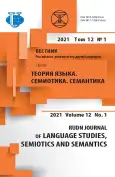Biz birgemiz, или Еще раз о диверсификации русского языка в Казахстане
- Авторы: Сулейменова Э.Д.1, Аканова Д.K.2, Аймагамбетова М.М.1
-
Учреждения:
- Казахский национальный университет имени аль-Фараби
- Чикагский университет
- Выпуск: Том 12, № 1 (2021)
- Страницы: 7-22
- Раздел: ФУНКЦИОНАЛЬНАЯ ГРАММАТИКА И ФУНКЦИОНАЛЬНАЯ СЕМАНТИКА
- URL: https://journal-vniispk.ru/2313-2299/article/view/323391
- DOI: https://doi.org/10.22363/2313-2299-2021-12-1-7-22
- ID: 323391
Цитировать
Аннотация
Критерии плюрицентрических языков, обобщенные «Рабочей группой по недоминантным разновидностям плюрицентрических языков» (WGNDV), а также ранее выдвинутое нами условие герметичности, непрозрачности, непонятности казахстанского русского были использованы для обсуждения возможности его постепенного образования. Сделаны два основных вывода: а) русский язык постсоветского пространства в настоящее время соответствует критериям плюрицентрических языков; б) русский язык в Казахстане переживает бурные и заметные по результатам диверсификационные процессы. Выделены аргументы казахстанских лингвистов, утверждающих (Б.Х. Хасанов, Е.А. Журавлева, Д.Д. Шайбакова и др.) или отрицающих (З.К. Сабитова, А.К. Казкенова и др.) квалификацию русского языка как варианта в Казахстане - стране долговременного и массового казахско-русского двуязычия. Поколения носителей русского языка (монолингвы - этнические русские, корейцы, украинцы и другие и билингвы - казахи, узбеки, уйгуры и другие) с доминирующим русским или доминирующим этническим языком - с разным эффектом вовлечены в процессы советской русификации и современной казахизации. Диверсификация русского языка в Казахстане сегодня происходит на фоне кардинального изменения статуса и функционального состояния казахского и русского языков; сокращения числа урожденных носителей русского языка; принципиальных перемен казахско-русского двуязычия, отражающегося в кризисе языковой идентичности части казахстанцев, в языковом сдвиге в сторону русского языка (корейцы, часть казахов, украинцы, малочисленные этносы и др.) и повороте языкового сдвига казахов; усиления позиций казахского языка в деловой сфере, культуре, образовании, масс-медиа, межэтническом общении; изменившегося вектора влияния языков (казахский русский) и открытости русского языка для устных и письменных заимствований, особенно в медиа текстах; наконец, новых коммуникативных потребностей казахстанцев. Длительное языковое и культурное пограничье, образующее присущую казахстанцам интериоризированную концептуально-ментальную картину мира, стало принципиальным фактором, стимулирующим диверсификационные процессы русского языка в Казахстане.
Ключевые слова
Об авторах
Элеонора Дюсеновна Сулейменова
Казахский национальный университет имени аль-Фараби
Автор, ответственный за переписку.
Email: esuleim@gmail.com
доктор филологических наук, профессор кафедры иностранной филологии и переводческого дела факультета филологии и мировых языков
050040, Республика Казахстан, Алматы, пр. аль-Фараби, 71Дана Аканова
Чикагский университет
Email: dakanova@gmail.com
Ph.D.
60637, Соединенные Штаты Америки, Chicago, Illinois, 5801 South Ellis AvenueМалика Муратовна Аймагамбетова
Казахский национальный университет имени аль-Фараби
Email: aimagambetovamalika@gmail.com
Ph.D., зав.кафедрой иностранной филологии и переводческого дела факультета филологии и мировых языков
050040, Республика Казахстан, Алматы, пр. аль-Фараби, 71Список литературы
- Vahtin, N.B., Mustajoki, A. & Protasova, E.Yu. (2010). Russian languages. Slavica Helsingiensia, 40, 5—16. (In Russ.). URL: http://www.pluricentriclanguages.org (accessed:10.11.2020).
- Muhr, R. (2016). The state of the art of research on pluricentric languages: Where we were and where we are now In Pluricentric Languages and Non-Dominant Varieties Worldwide, Österreichisches deutsch sprache der gegenwart, R. Muhr (Ed.). Berlin. B. 18. pp. 13—40.
- Alisharieva, A., Ibraeva, Zh. & Protasova, E. (2017). Kazakh Russian: a view from the outside In Ab Imperio. The Global Condition: Local Names for Universalism. New York-Kazan’. Vol. 4. pp. 231—263. (In Russ.).
- Suleimenova, E.D. (2010). To understanding the likelihood of a variant of the Russian language in Kazakhstan. Slavica Helsingiensia, 40, 268—282. (In Russ.).
- Suleimenova, E.D. (2011). Language processes and politics. Almaty. (In Russ.).
- Hasanuly, B. (2007). Languages of the peoples of Kazakhstan: from silence to development strategy. Almaty. (In Russ.).
- Muhr, R. (2019). European pluricentric languages in contact and conflict In European Pluricentric Languages in Contact and Conflict, R. Muhr, J. Àngel, M. Castells, J. Rueter (Eds.). Österreichisches deutsch sprache der gegenwart Herausgegeben. Berlin. Book 21. pp. 11—64.
- Muhr, R. (2012). Linguistic Dominance and Non-Dominance in Pluricentric Languages: A. Typology In Non-Dominant Varietes of Pluricentric Languages. Frankfurt am Main. pp. 23—48.
- Bachtikireeva, U.M. (2014). Russian is a Multinational Language? Russian Journal of Linguistics, 2, 16—13. (In Russ.).
- Bachtikireeva, U.M. (2010). To the problem of variability of the Russian lexical system. RUDN Journal of Language Studies, Semiotics and Semantics, 3, 117—123. (In Russ.).
- Crystal, D. (1987). The Cambridge Encyclopedia of Language. Cambridge: Cambridge University Press.
- Shaibakova, D.D. (2006). The functioning of the inorganic language in a multiethnic society (based on the Russian language in Kazakhstan). Almaty. (In Russ.).
- Zhuravleva, E.A. (2007). Variation of the lexical system: Russian as a multinational language. Almaty, 2007. (In Russ.).
- Shaibakova, D.D. (2016). Is Russian pluricentric? Przegląd Wschodnioeuropejski, VII / 2, 257—268. (In Russ.).
- Sabitova, Z. (2014). Russian language in Kazakhstan: national variant? Slavica Helsingiensia, 45, 208—2017. (In Russ.).
- Kazkenova, A.K. (2017). Ontology of the borrowed word. Moscow. (In Russ.).
- Kazkenova, A. & Zhirenov, S. (2015). Independent development and mutual influence of the Kazakh and Russian languages in the Republic of Kazakhstan. Przegląd Wschodnioeuropejski, 6/1, 143—152. (In Russ.).
- Sinyachkin, V.P. (2011). Historical-and-cultural Turkisms layer in the everyday Russian language perception. RUDN Journal of Language Studies, Semiotics and Semantics, 4, 85—95. (In Russ.).
- Sarybai. URL: https://m.facebook.com/story.php?story_fbid=3753888887955752&id=100000 040344125 (accessed: 10.11.2020). (In Russ.).
- Suleimenova, E.D., Shaimerdenova, N.Zh. & Musabekova, U.E. (2015). Onomastics of Kazakhstan: geographical names and otonymic derivatives. More than 3000 units. Almaty. (In Russ.).
- Musataeva M., Nikitina S., Kazkenova A. Comprehensive dictionary of the Russian language. Almaty, 2005. (In Russ.).
- Russian National Corpus. URL: https://ruscorpora.ru/old (accessed: 10.11.2020). (In Russ.).
- Russian National Corpus. URL: https://ruscorpora.ru/new (accessed: 10.11.2020). (In Russ.).
- Havranek, B. (1972). On the problem of mixing languages In New in linguistics. Iss. VI. Moscow. pp. 9—111. (In Russ.).
Дополнительные файлы









